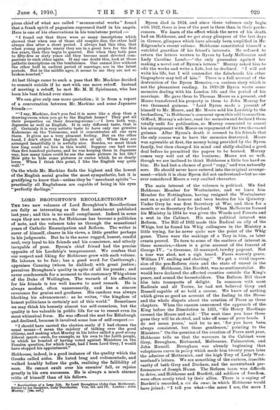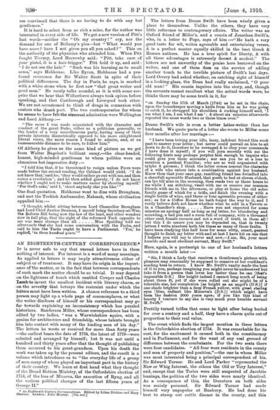LORD BROUGHTON'S RECOLLECTIONS.* THE two new volumes of Lord Broughton's
Recollections are fully as interesting as the first instalment published last year; and this is no small compliment. Indeed in some ways they are more so, for Hobhouse has become a politician of note, and the volumes take us through the sensational years of Catholic Emancipation and Reform. The writer is surer of himself, clearer in his views, a little gentler perhaps in his judgments. But he is the same rugged, honest, candid soul, very loyal to his friends and his conscience, and utterly incapable of pose. Byron's chief friend had the precise opposite of his Lordship's temperament. We confess that our respect and liking for Hobhouse grow with each volume. He labours to be fair; has a, good word for Castlereagh ; appraises Canning (whom he disliked) with great justice; perceives Brougham's quality in spite of all his pranks ; and never condescends for a moment to the customary Whig abuse of the Duke of Wellington. The warmth of his affection for his friends is too well known to need remark. He is
always modest, often unnecessarily, and has a sincere reverence for genius and goodness. His candour was always blocking his advancement : as he writes, " the kingdom of
honest politicians is certainly not of this world." Sometimes we may think his honesty almost too self-conscious, but the
quality is too valuable in public life for us to resent even its most whimsical form. He was offered the seat for Edinburgh and declined, because it involved some loss of self-respect :— "I should have carried the election easily if I had chosen the usual means—I mean the cajolery of talking over the good citizens, and making what Murray in his letter called a good strong Liberal speech—such, for example, as his own to the Leith people, in which he boasted of having voted against Ministers on the Pension question, for which boast, bad I been Lord Grey, I would have stopped his appointment."
Hobhouse, indeed, is a good instance of the quality which the Greeks called aidos. He hated brag and rodomontade, and
walked humbly before the gods, realising the fallibility of man. He cannot exult over his enemies' fall, or rejoice greatly in his own successes. He is always a much sterner critic of himself than of his fellows.
• Recollections of a Long Life. By Lord Broughton (John Cam Hobhouse). Edited by his Daughter, Lady Dorchester. Vols. III. and IV. London : John Murray. [24s. net.] Byron died in 1824, and since these volumes only begin with 1822, there is less of the poet in them than in their prede- cessors. We learn of the effect which the news of his death bad on Hobhouse, and we get stray glimpses of the last days in Greece, glimpses which have already been amplified in Mr. Edgcumbe's recent volume. Hobhouse constituted himself a watchful guardian 8f his friend's interests. He• refused to return the letters written to Byron by Lady Melbourne and Lady Caroline Lamb,—" the only guarantee against her making a novel out of Byron's letters." Murray asked him to edit the works and write a Life, but Ile declined. "I will not write his life, but I will contradict the falsehoods his other biographers may tell of him." There is a full account of the destruction of the Byron Memoirs,—a curious story which is not the pleasantest reading. In 1819-20 Byron wrote some memoirs dealing with his London life and the period of his marriage. He gave them to Thomas Moore as a present, and Moore transferred his property in them to John Murray for two thousand guineas. " Lord Byron made a present of himself to Mr. Moore, and Mr. Moore sold his Lordship to the booksellers," is Hobhouse's comment upon this odd transaction. Gifford, Murray's adviser, read the memoirs and declared them- totally unfit for publication, so Murray consented to cancel his arrangement with Moore on repayment of the two thousand guineas. After Byron's death it seemed to his friends that the only course was to have the memoirs destroyed. Moore was agreeable at first, the money being provided by the Byron family, but then changed his mind and shilly-shallied a good._ deal before he permitted the papers to be burned. Murray comes very well oat of the business; Moore not so well, though we are inclined to think Hobhouse a little too bard on him. He had lost a chance of good "copy," and was naturally sore. He should never have entered into the original arrange- ment—which it is clear Byron did not understand—but no one. ever considered Moore a very exalted character.
The main interest of the volumes is political. We find Hobhouse Member for Westminster, and we leave him Member for Nottingham, having resigned the Westminster- seat on a point of honour and been beaten for his Quixotry. Under Grey he was first Secretary at War, and then for a month or so Secretary for Ireland. When Melbourne formed his Ministry in 1834 he was given the Woods and Forests and a seat in the Cabinet. His main political interest was. Reform. The Bill of 1832 made this Radical an ally of the Whigs, but he found his Whig colleagues in the Ministry, a little trying, for he never quite saw the point of the Whig game. There were the makings of a Tory in him, as later events proved. To turn to some of the matters of interest in. these memoirs,—there is a grim account of the funeral of George IV., "a tiresome, ill-managed, tawdry pageant. Not a tear was shed, not a sigh heard. Faces scarcely grave. William IV. smiling and chatting." We get a vivid impres7 sion of the pre-Reform riots and the state of unrest in the country. Hobhouse, like Burdett, was no sentimentalist. He would have declared the affected counties outside the King's peace, and armed the householders. The Reform Bill threw him into transports of delight. In common with most. Radicals and all Tories, le bad not believed Grey and Russell capable of so bold a course. We know of nothing which gives so good an account of the feeling in the House and the whole dispute about the creation of Peers as these. chapters. When the cannon announced the approach of the- King before the Dissolution in 1831, "Sir Henry Hardinge crossed the House and said : The next time you hear those guns they will be abutted, and take off some of your beads. I do not mean yours,' said he to me, ' for you have been always consistent, but those gentlemen,' pointing to the Ministers." On the question of the creation of Peers next year, Hobhouse tells us that the waverers in the Cabinet were Grey, Brougham, Richmond, Melbourne, Palmerston, and. John Russell. Brougham was already beginning that voluptuous curve in policy which made him twenty years later the admirer of Metternich, and the high Tory of Lady West- morland's letters. We see something of the curious, irascible vanity of both Grey and Durham, and the mountebank per- formances of Joseph Hume. The Reform team was difficult, to drive, and Hobhouse and Burdett, old soldiers of freedom,. were often sorely tried by their allies, There is a saying of Burdett's recorded, a cr1 du mar, in which Hobhouse would have joined: " I tell you what—the more I see, the more I
am convinced that there is no having to do with any but gentlemen." • It is hard to select from so rich a mine, for the author was interested in every side of life. We get a new version of Pitt's last words—neither the " Oh my country !" cry, nor the demand for one of Bellamy's pies—but " What would you have more P have I not given you all you asked P " This on the authority of the physician who attended him. When Pitt fought Tierney, Lord Harrowby said: "Pitt, take care of your pistol, it is a hair-trigger." Pitt held it up, and said : "I do not see the hair." "Such was his learning as to small arms," says Hobhouse. Like Byron, Hobhouse had a pro-
found reverence for Sir Walter Scott in spite of their political differences. The day in Paris, he says, is marked with a white stone when he first saw "that great writer and good man." He rarely talks scandal, so it is with some sur- prise that we hear that Wilberforce always took opium before speaking, and that Castlereagh and Liverpool took ether. We are not accustomed to think of drugs in connexion with orators who drank port. The two contemporaries for whom he seems to have felt the sincerest admiration were Wellington and Lord Althorp :— "The more I was made acquainted with the character and conduct of the great Duke, either as a politician generally, or the leader of a very miscellaneous party, having many of their private interests diametrically opposed to his more enlightened liberal views, the more reason I found to admire, and, at an immeasurable distance to be sure, to follow him."
Of Althorp he gives us the same kind of picture as we get
from Walter Bagehot's brilliant essay,—the clear-headed, honest, high-minded gentleman to whom politics were an obnoxious but imperative duty :—
" I told him that, if he threatened to resign unless Peers were made before the second reading, the Cabinet would yield. • 'I do not know that,' said he; 'they would rather go out with me, and then comes a revolution' ; and he then added gravely, do not know whether I ought not to make matters easier by shooting myself.'
For God's sake,' said shoot anybody else you like.'
One final quotation. Hobhouse went to dine with Brougham,
and met the Turkish Ambassador, Nahmek, whose civilisation appalled him :— "I thought, whilst sitting between Lord Chancellor Brougham and Lord Chief Justice Denman, I myself being Secretary-at-War, the Worm Bill being now the law of the land, and other wonders now in full play, that the sight of the reformed Turk opposite to
me was more strange than all Miss Spalding told me afterwards that she had some conversation with the Pasha, and said to him the Turks ought to have a Parliament. Yes,' he replied, 'in three hundred years."'



















































 Previous page
Previous page